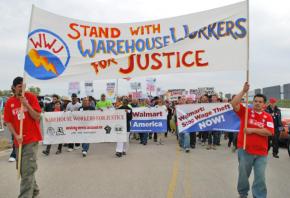Wal-Mart calls the riot police
Supporters showed their solidarity with striking Wal-Mart warehouse workers in Elwood, Ill.--and police responded with heavy-handed repression.
SOME 600 people came out to an October 1 rally in a show of solidarity with 38 striking workers at a Wal-Mart warehouse in Elwood, Ill. Warehouse Workers for Justice (WWJ), a group supported by the United Electrical, Radio and Machine Workers of America (UE), organized the action.
The workers walked out of the warehouse, which is part of the Wal-Mart supply chain, on September 15 to combat retaliation against workers who sued the company for its cruel working conditions and routine failure to pay workers for time they worked. One person described the unfair labor practice lawsuits filed against the company as a "bandage on a cancerous wound."
According to striking worker Bill Bailey, 30 of the workers--out of a workforce of about 100--originally walked out and were then joined by eight others. "Today will turn the tide," Bailey said of the rally. The Elwood workers themselves were inspired to walk out after a similar work stoppage in southern California at a Wal-Mart warehouse operator.
Although the workers on strike are contracted by Schneider Logistics instead of direct employees of Wal-Mart, they believe that Wal-Mart is to blame for the poor working environment, and they feel that the company is creating a model that other retail giants' warehouses are compelled to follow. Wal-Mart has a long-established reputation for insisting on cost-cutting measures and rock-bottom prices from various suppliers, and its relationship to its warehouse operators is no exception.

The town of Elwood, located about an hour southwest of Chicago, is home to one of the busiest "import stops on the planet," in the words of one warehouse worker.
Service Employees International Union and Chicago Jobs With Justice coordinated buses to get supporters from Chicago to Elwood. Also present were members of Chicago Teachers Union, Workers United, United Food and Commercial Workers, Action Now, Stand Up Chicago, Arise, Occupy Chicago, and other coalitions and campaigns focused on opposing abuses by the mega-retailer.
The rally, which took place two weeks into the strike, had actually been planned long ago by WWJ in order to shine a spotlight on the miserable conditions facing workers in these warehouses.
Many speakers addressed the kinds of abuse workers are subjected to by Wal-Mart, including warehouse temperatures that range from more than 120 degrees during the summer to subzero during the winter, gender and racial discrimination, unpaid overtime and other wage theft that amounts to more than $1 million in lost pay, and shocks, electrocution and other incidents that have led to injury and even death.
One of the speakers described how the company compelled a worker who had suffered a life-threatening injury to submit to a company drug test before being allowed to go to the hospital for treatment.
Mike Compton, an employee at the warehouse for more than three months, described himself as a "veteran" because the turnover rate is so high. This is direct result of the sweatshop-like conditions and the company's retaliation against those who speak out against such treatment.
"We are only referred to as 'bodies,'" said Compton. "They have no regard for our wellbeing. We are constantly told to push harder. We are never done."
Bob Kingsley, UE's organizing director, spoke to the overall growth of corporate power and the struggles that all working people have to go through as a result of it. And he expressed UE's determination to support the Warehouse Workers for Justice campaign.
AFTER THE rally concluded, demonstrators marched down the road to the Wal-Mart warehouse, chanting, "Hey, hey, ho ho, poverty wages have to go," "Wal-Mart is unfair, all we want is our fair share" and "What's Wal-Mart have to hide? Sweatshop products made inside."
Upon arriving at the gate, a group of 17 workers, clergy and community supporters sat down in the middle of the street to block the entrance and prevent shipments from getting into the distribution center. The 17 began to sing the civil rights anthem "We Shall Overcome," and the 600 people with them joined in.
It didn't take long for the Elwood police to deem the action "illegal." Officers decked out in riot gear arrived on the scene, accompanied by a black Hummer with a Long Range Acoustic Device (LRAD) attached to it. LRADs are sound cannons used to disperse crowds by with painful and sometimes damaging blasts of noise. The police threatened demonstrators with tear gas and other "less-lethal" actions if they decided not to leave.
After a short standoff, the police arrested the 17 activists one by one--although the question lingers of why police should arrest peaceful protesters standing for the cause of justice instead of arresting the warehouse management that has imposed working conditions so harsh that employees regularly suffer injury, illness and even death.
The reason for Elwood's display of overwhelming force should be obvious enough: This facility isn't just any warehouse. It sits amid half a billion square feet of warehouse space--one of the largest concentrations on the planet--and 150,000 warehouse employees.
And intimidation has also been "Plan A" for Wal-Mart and other retail giants when confronted by an individual, a union or some other cause they feel represents a threat to their stream of profits.
The warehouse workers also understand what's at stake. "We would not be bringing out this many people to a parking lot in Elwood, Ill., if we weren't doing something special," said warehouse worker Curtis Tucker.


